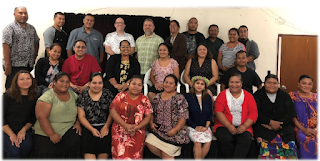Beth A. Rutkowski, MPH
Co-Director, Pacific Southwest ATTC
In the 2012-17 funding cycle, the Pacific Southwest Addiction Technology Transfer Center (Pacific Southwest ATTC) region was expanded to encompass HHS Region 9. Formerly serving only California and Arizona, the Pacific Southwest ATTC now also serves Nevada, Hawaii, American Samoa, Commonwealth of the Northern Mariana Islands, Federated States of Micronesia, Guam, Republic of the Marshall Islands, and Republic of Palau.


One strategy employed to service the unique and varied needs of the Pacific Jurisdictions was to join forces with the SAMHSA-funded Pacific Jurisdictions Workforce Development Initiative. This initiative began in 2011 to develop local expert trainers, grooming to provide the on-the-ground training and technical assistance to local behavioral health providers.
Topics were determined by each jurisdiction to address local needs (e.g., Matrix Model treatment, SBIRT, adolescent treatment, culturally responsive treatment and prevention). During the first year of the project, participants visited host sites in the mainland United States to gain experience from organizations providing services in their chosen focus area.
In March 2013, the Pacific Southwest ATTC, in partnership with the Pacific Behavioral Health Collaborating Council (PBHCC), conducted a conference attended by 27 individuals from the six Pacific Jurisdictions, along with representatives from the SAMHSA’s CSAT, CSAP, CMHS, and the Regional Administrator, HHS Region 9 (Dr. Jon Perez).
Participants engaged in meetings that focused on developing participants' skills in training and technical assistance. Each participant provided training on their focus area to peers and invited guests, and received individual coaching to improve skills. Participants heard from Drs. Thomas Freese (UCLA ISAP) and Steve Gallon (Oregon Health & Science University) on effective training and technical assistance strategies. Participants were also invited to UCLA ISAP to hear from ISAP's principal investigators about domestic and international research activities. The four-day conference ended with a recognition ceremony.
Access to local training and technical assistance experts is essential for the Pacific Jurisdictions. These island nations span an area of ocean larger than the continental United States. Their total land mass (669 islands and atolls spread across 5 million square miles of ocean) is smaller than the five states of New England. The total population of the Pacific Jurisdictions is approximately 451,000, and 19 languages are spoken. The island populations self-identify predominantly as native to their island, although segments of the populations are Filipino (5%-26%), Chinese (2%–5%), "other" Pacific Island background (2%–8%), and 2%–6% Whites or “other.”
Since 2013, the Pacific Southwest ATTC has visited Hawai’i and five of the six Jurisdictions on more than 15 occasions. The days are long, but the relationships developed and impact made is most satisfying. Recently, with supplemental funding from the PBHCC, Drs. Thomas Freese and Chris Rocchio and Mr. Alex Ngiraingas, an expert trainer from Palau, traveled to Pohnpei, FSM, to conduct a weeklong Alcohol and Drug Certification (ADC) Academy, to prepare providers to challenge the IC&RC certification exam. Because of this intensive weeklong training experience, eight people achieved regional certification, and one person achieved international certification. This increase in certified counselors represents a huge improvement in building a larger, more competent behavioral health workforce in the Pacific.


No comments:
Post a Comment